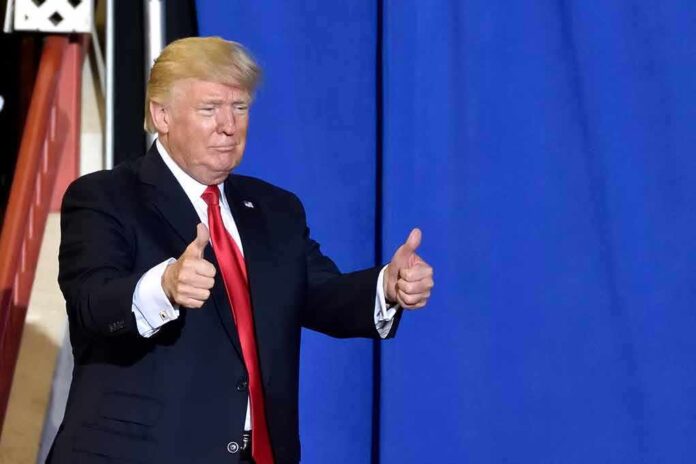President-elect Trump’s potential rollback of EV tax credits could reshape the automotive industry, impacting both sustainable transportation and traditional manufacturing.
At a Glance
- Trump’s transition team considers eliminating the $7,500 federal EV tax credit
- Tesla supports ending the subsidy, while other automakers may face challenges
- Oil and gas sectors back the move, anticipating a return to traditional vehicle production
- Critics argue the rollback could hinder U.S. competitiveness in the EV market
- Congressional approval would be required to repeal the tax credit
Trump’s Plan to Revamp EV Policies
President-elect Donald Trump’s transition team is considering a significant shift in U.S. energy policy by potentially eliminating the federal electric vehicle (EV) tax credit. This credit, offering up to $7,500 for EV purchases, has been a cornerstone of President Biden’s Inflation Reduction Act (IRA) and a key driver in making electric vehicles more accessible to American consumers.
The proposed rollback is part of a broader tax reform package that may include extending the Tax Cuts and Jobs Act from Trump’s first term. This move aligns with Trump’s campaign promises to target Biden’s clean energy initiatives, including the cancellation of the EV mandate.
Exclusive: President-elect Donald Trump's transition team is planning to kill the $7,500 consumer tax credit for electric-vehicle purchases as part of broader tax-reform legislation, two sources with direct knowledge of the matter told Reutershttps://t.co/lxWXtGFiVD
— Reuters (@Reuters) November 14, 2024
Impact on the Automotive Industry
The potential elimination of the EV tax credit has sparked diverse reactions across the automotive sector. Tesla, led by Elon Musk, has reportedly expressed support for ending the subsidy. This stance aligns with Musk’s previous statements suggesting that removing the credit would minimally impact Tesla while potentially affecting its competitors more significantly.
“Tesla representatives have expressed support for ending the subsidy to Trump’s transition committee.” – Reuters report
However, other manufacturers like Ford, General Motors, and Rivian could face challenges if these incentives are removed. The news of the potential tax credit change has already impacted the stock market, with shares of Tesla, Rivian, and Lucid experiencing declines.
Arguments For and Against the Rollback
Proponents of ending the tax credit, including some oil and energy advocates, argue that the market should determine the success of EVs without government subsidies. Tim Stewart of the U.S. Oil & Gas Association suggests that removing the credit could allow automakers to return to traditional production lines.
“If I was a CEO, I would quietly be relieved to have a reason to shift production lines back to traditional models and invest in new hybrid technologies” – Tim Stewart
On the other hand, critics argue that eliminating the tax credit could hinder efforts to reduce carbon emissions and slow EV adoption rates. Energy Secretary Jennifer Granholm warns that its removal would hurt U.S. competitiveness in the EV industry. Ingrid Malmgren of Plug In America cautions that the move could harm U.S. auto industry investments in EV manufacturing.
“The auto industry is investing billions of dollars in EV battery and EV manufacturing in the United States. Eliminating the tax credit will hurt the U.S. auto industry and make American manufacturers less globally competitive” – Ingrid Malmgren
Potential Outcomes and Legislative Process
Analysts suggest that financially strong companies like Tesla could benefit from the removal of the tax credit, while smaller companies might struggle. The potential policy change could slow the shift toward EVs, particularly in automotive hubs like Detroit.
It’s important to note that repealing the EV tax credit would require congressional approval and is expected to be a contentious issue in upcoming legislative debates. There is also uncertainty about whether other clean energy tax credits, such as those for EV chargers and solar panels, might also be at risk under the proposed changes.
As the debate continues, the automotive industry, consumers, and policymakers will be closely watching the developments surrounding this potential shift in U.S. energy and transportation policy.
Sources:
- Is the EV Tax Credit Going Away? What You Need to Know
- Trump’s cut to Biden’s EV tax credit, backed by Musk, may impact auto industry, experts say
- Trump’s cut to Biden’s EV tax credit, backed by Musk, may impact auto industry, experts say











